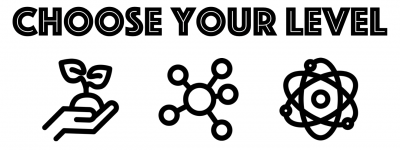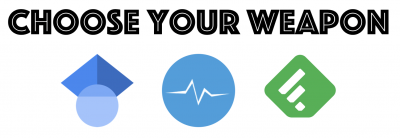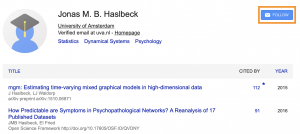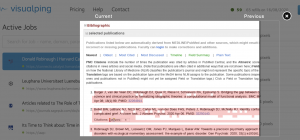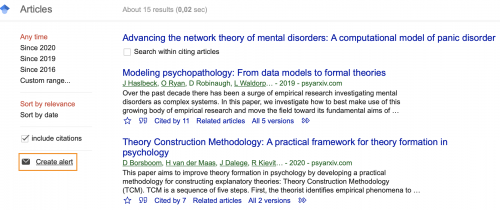Staying on top of research
Why & When
As an aspiring scientist, it is important to follow the current discussions in science. Staying on top of research is an essential skill that will enhance your science game significantly. Because that's the gist: There is more to science than searching for terms in Google Scholar.
Ultimately, you want to:
- identify key papers that are relevant for your research and read the papers that cite these key papers
- identify key authors in your field and follow whatever they publish next
- identify key journals in your field that have a high rating (so are being cited frequently) and therefore publish the most important news in your field
The Beginner Level
You have just started out with your study program and want to understand research as such. You may have recently found out that journals exist and that journal ratings are a thing. This stage is all about you gaining knowledge about research and also discovering what interests you most. On this level, you could follow:
- The journals "Nature" and "Science" are very basic newspapers of science. They tend to have rather sensational titles, feature mostly short papers but also report the main news.
- If you are new to reading research, there's a bunch of resources out there to get you started (). What's important is that papers are the main way of communicating, it is the primary literature and is the ultimate go-to for science. Your professors and instructors pinpoint you to resources in their lectures, and most text books reference papers as well. Secondary sources can only scarcely account for the complexity of a paper. You approach papers always in the same way: scan the abstract, understand the basic method the authors are using and dig into the parts that are relevant for you.
The Advanced Level
You've understood the game of science and have written your first few papers for your degree program. This means you levelled up! Now it's time to follow some general resources in your field. Ask your professors for these key resources or take some from the lists below:
Feature more study programs!
These resources can be very influential authors and journals. For Computer Science disciplines, you'll also find that conferences play a major role as new results get published faster. This being said, for Machine Learning, the following resources are important:
- International Conference of Machine Learning (ICML)
- NeurIPS Conference
- Knowledge Discovery and Data Mining Conference (KDD)
- Machine Learning Journal (MLJ)
- Data Mining and Knowledge Discovery (DAMI)
- Journal of Machine Learning Research (JMLR)
The Expert Level
At this stage, you know where you are going in science and have identified your research niche. You want to become an expert in that niche? Well, you need to stay uptodate on a granular level:
Different tools allow you to follow the authors, papers and journals you just identified. The following services and apps are your friend:
- Google Scholar Alerts
- Visualping
- Feedly
The first three apps are aggregators, they merely fetch existing literature from other webpages. You know this from Google, visualping does it for a website you define and Feedly does it for RSS style pages. Only Twitter is where you follow the primary source directly. There is a number of pages out there that let you follow content directly, websites like researchgate or journal websites. We believe that most use cases should be covered by the 4 services mentioned above, but of course, this list is not exhaustive.
Let's get on with research. We will be following a paper that did a computational model for Panic Disorder. I am very interested in computational models and the network approach they chose seems to be exactly what I was looking for.
After having decided I want to follow this work, I have different options.
Where to follow authors
1. Google Scholar: Jonas Haslbeck, the second author, seems to publish more on this topic. I therefore choose to follow his work. I found him on Google Scholar. I can then click on the follow button to receive email alerts whenever he publishes an exciting new paper. 2. Visualping: Sometimes, authors don't have a Google Scholar profile you can follow. This is the case for the first author, Donald Robinaugh. I therefore decide to monitor changes on his website using services like visualping. I can search for the author's institutional webpage or their private webpage where their newest publications are listed. Whenever Mr. Robinaugh publishes a new paper, visualping will detect a change and send me an email.
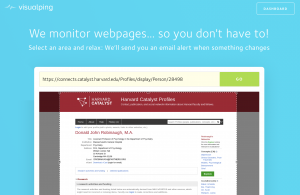
3. Feedly
4. Twitter: There's a whole community of scientists on Twitter. Authors share their recent papers and discuss other people's research below their tweets. The authors that you'd follow on Google Scholar and Visualping you can also follow there. While Google Scholar and Visualping send you email alerts, Twitter requires you to become active. Make it a habit to scroll through science twitter, maybe attached to whenever you scroll through other social medias. Maybe even create an extra account for this so you can safely follow scientists without them reading potential private tweets :-) Science Twitter awaits you, and it doesn't judge if on top, you also follow your favourite non-related NASA scientist.
Where to follow papers
Next on, you want to follow the paper itself. I see it as a key to my work so every related work is also potentially interesting for me. 1. Google Scholar: I found the paper on Google Scholar, clicked on who cited it and created an email alert.
2. Visualping:
3. Feedly
4. Twitter: Well, hello friend. Twitter really isn't the right platform to follow papers. Maybe try a different platform ;)
Where to follow journals
A whole new world: Keywords
You've come to a dark place. Following keywords is an art for itself and be warned, it is dark and full of traps. Google Scholar but also sites like Scopus (use with VPN and click on "Check Access" to access the site) allow you to search for different parameters:
- Papers with certain words in titles
- Papers by certain authors
- Papers in certain journals
- Papers with certain author-specified keywords'
funny examples
2. Native Websites:
Where to follow journals
Research + ResearchGate Boole'scher Search String: Ecology in: Keyword: sustainability and Not bacteria
Links & Further reading
References:
- Icons for "Choose Your Level" are designed by lagotdesign and taken from: https://thenounproject.com/lagotdesign/collection/lagotline-science/
- The Visualping icon: Salager / CC BY-SA (https://creativecommons.org/licenses/by-sa/4.0)
Further Reading:
- Henrik's take on how to follow scientific literature including how literature reviews work
